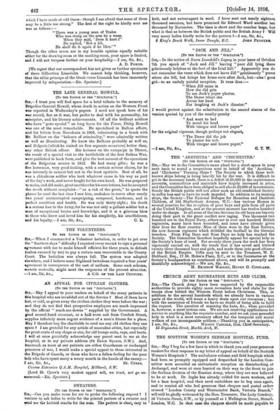THE LATE GENERAL HOWELL.
(To THE EDITOB OF THE " SPECTATOR.") 819.,—I trust you will find space for a brief tribute to the memory of Brigadier-General Howell, whose death in action on the Western Front was reported in Wednesday's papers. I need not speak here of his war record, fine as it was, but prefer to deal with his personality, his enterprise, and his literary achievements. Of all the brilliant eoldiers who have "gone special" on long leave for the Times, Philip Howell was one of the most remarkable. He specialized in Balkan affairs, and his letters from Macedonia in 1903, culminating in a brush with Mr. Balfour on the "balance of criminality," were admirably written as well as illuminating. He knew the Balkans probably as well as, and Bulgaria (which he visited on five separate occasions) better than, any other British officer. His lectures on the campaign in Thrace, the result of a special visit to the battlefields of the first Balkan War, were published in book form, and give the best account of the operations of the Bulgarian armies in 1912. He had many gifts ; he was a fine horseman, very good-looking, with a certain serious charm, for he was intensely in earnest but not in the least egotistic. Best of all, he was a chivalrous soldier who took whatever came in his way as part of the day's work, and never fought for his own hand. Ho was prepared to make, and did make, great sacrifices for his convictions, but he accepted the result without complaint—" as a rub of the green," to quote the phrase ho used the last time I saw him, unshaken in nerve after nearly two years' uninterrupted campaigning, composed, handsome, and in perfect condition and health. He was only thirty-eight ; his death ia a serious loss to the Army, for he was not only a gallant soldier but a man of exceptional brains and knowledge, and it is a grievous blow to those who knew and loved him for his simplicity, his unselfishness,


































 Previous page
Previous page